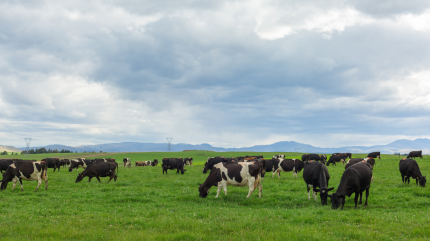
UK dairy farmers will need to invest around £3.9bn ($5bn) in the next decade to future-proof their farms against climate change, according to new research.
The findings, put together by UK dairy consultancy firm Kite Consulting, are based on an assessment of 850 dairies nationwide.

Discover B2B Marketing That Performs
Combine business intelligence and editorial excellence to reach engaged professionals across 36 leading media platforms.
Around £472,539 per farm will be needed to build the necessary infrastructure and extra land to support climate resilience over the next ten years, the report said. This requires farmers to pay £47,254 a year.
An additional 2.4 pence per litre a year across that period is likely to be needed to fund environmental compliance. This comes on top of annual production expenses.
Kite has based average costs per dairy on an average herd size of 236, housed for an approximate 30-week period.
Some 48% of the dairies analysed told the consultancy they are looking to boost annual milk production over the next two to three years.

US Tariffs are shifting - will you react or anticipate?
Don’t let policy changes catch you off guard. Stay proactive with real-time data and expert analysis.
By GlobalDataAccording to the report, UK dairy farms require an additional 1,350 tonnes of silage storage per farm to ensure farms are protected against extreme weather conditions such as droughts, or delayed pasture turnout for another 1.5 years.
Kite estimates that 85% of the nation's dairies have under eight months of slurry storage, so will also need to inject capital to reach eight months storage.
The Clean Air Strategy 2019, which proposed to cover all slurry and digestate stores by 2027, could also require dairy farms to invest in covered slurry storage. While new covered slurry storage regulations are not expected to be set in motion in three years' time, “increasing regulatory requirements in this area over the coming years” are expected.
Kite's findings predict 92% of dairy farms will need to inject cash into covered slurry storage if new laws are introduced.
Boosting slurry storage to eight months with covers is expected to cost around £92,296 per farm.
By not investing in mitigating climate risks, the report said that “the industry will be unprepared for extreme weather events. This is likely to jeopardise the future of some of these farms and put milk production at risk.
“Investment from the industry is therefore critical to ensuring the secure supply of milk.”
But sourcing investment hasn't been easy over the past few years, and has resulted in some UK dairy businesses shutting up shop.
Last month, administrators were appointed at the Anglesey-based own-label cheesemaker Mona Island Dairy after being unable to obtain enough short-term funding from shareholders to support production.
A post on its website at the time said the group had faced a challenging time since it received a £20m investment into its headquarters in Anglesey, Wales in 2021.
“After five years of striving to develop the newest and most sustainable cheese factory in Europe and fighting against many factors outside of our control, Mona Dairy in Anglesey is sad to announce that it has failed to source sufficient short-term funding from its key stakeholders to keep functioning in its current form,” the statement said.





